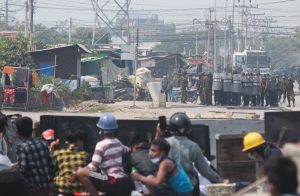On Saturday, Myanmar’s military junta officially labeled the country’s shadow National Unity Government (NUG) and its nearly announced armed wing as “terrorist organizations.”
The NUG was established last month by the Pyidaungsu Hluttaw Representative Committee (CRPH), a group of elected legislators who were barred from taking their seats when the military seized power on February 1. Last week, the National Unity Government announced the establishment of it’s a People’s Defense Force (PDF), a possible precursor to an ethnically inclusive nationwide federal army.
On Saturday evening, state television announced that the NUG and PDF, as well as the CRPH, had been added to the junta’s list of “terrorist organizations.”
“We ask the people not to … support terrorist actions, nor to provide aid to the terrorist activities of the NUG and the CRPH, which threaten the security of the people,” state television said.
Previously, the junta had declared these groups “illegal associations” and said that making any contact with these organizations would be considered high treason. But this new classification as a “terrorist organization” means that anyone who communicates with its members, including journalists, could be prosecuted under the country’s anti-terrorism laws, which carry heavy prison sentences.
This came a couple weeks after a similar designation was made by the Indonesian government, after the April 26 assassination of a high-ranking intelligence official by separatist insurgents in Papua, the country’s easternmost province. The killing of Brig. Gen. I Gusti Putu Danny Nugraha followed weeks of increasing attacks the Free Papua Organization and its military wing, the West Papua National Liberation Army, which have long fought for the region’s independence from Jakarta.
On April 29, an Indonesian minister responded to the killing by officially branding the WPNLA and other armed Papuan resistance groups “terrorists.”
As Vidhyandika Djati Perkasa and Alif Satria argued in The Diplomat last week, labeling a group or individual a “terrorist” usually closes off any possibility of a negotiated resolution to the conflict. After all, who negotiates with terrorists? As they pointed out, “Labeling the [Free Papua Organization] a terrorist organization will only complicate the resolution of Papua’s long standing low-intensity conflict.”
None of this bodes well for outside diplomatic efforts aimed at ending Myanmar’s post-coup crisis, including the process initiated by the special summit of the Association of Southeast Asian Nations (ASEAN) on April 24.
The ASEAN meeting established five points of consensus between the bloc’s 10 member states, including a call for “an immediate cessation of violence in Myanmar” and for “constructive dialogue” between the two warring parties. The consensus also included the appointment of a special ASEAN envoy and their dispatch to the country for talks with the military junta.
Over the weekend, the news leaked out that ASEAN was planning to send an envoy – so far unnamed by the Southeast Asian bloc – to Myanmar after the end of Ramadan next week, to hold further talks with Min Aung Hlaing and other junta leaders.
Sure enough, on Friday the military said that it would not agree to a visit by ASEAN’s envoy until it could establish “stability” in the country. “Right now, we are prioritizing the security and stability of the country,” Major Kaung Htet San, a spokesman for the military council, told a televised briefing. “Only after we achieve a certain level of security and stability, we will cooperate regarding that envoy.”
Given the protests that continue across the country, such “stability” – to say nothing of talks aimed at resolving Myanmar’s crisis – could be very far away indeed.













